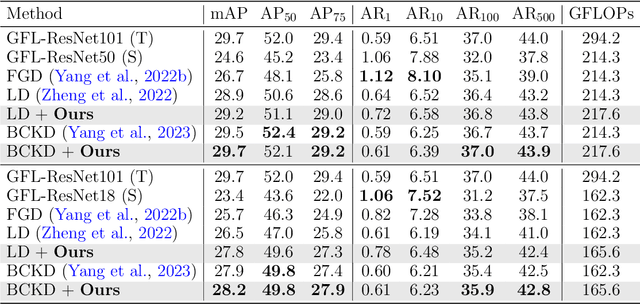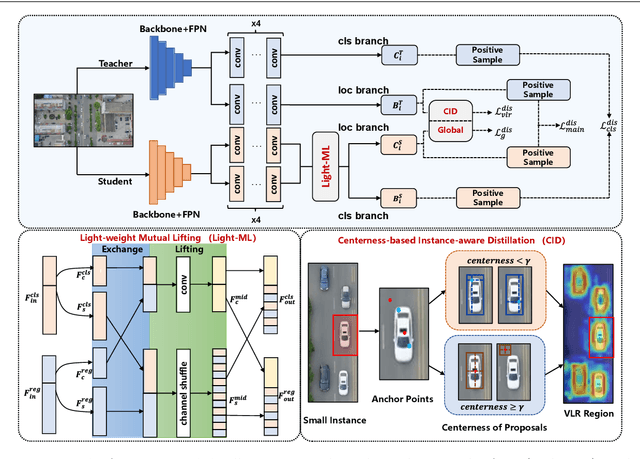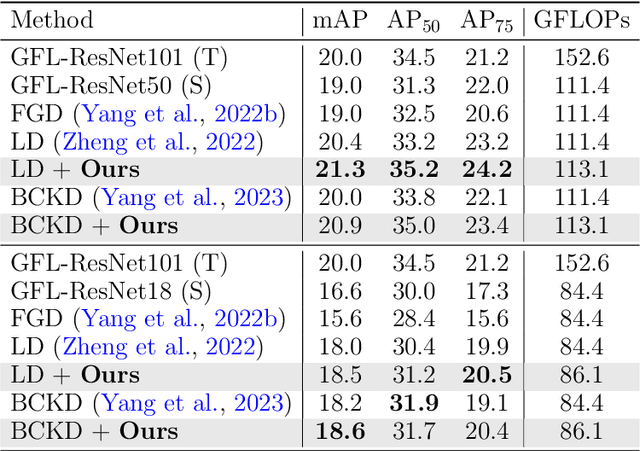Bowei Du
Centerness-based Instance-aware Knowledge Distillation with Task-wise Mutual Lifting for Object Detection on Drone Imagery
Nov 05, 2024



Abstract:Developing accurate and efficient detectors for drone imagery is challenging due to the inherent complexity of aerial scenes. While some existing methods aim to achieve high accuracy by utilizing larger models, their computational cost is prohibitive for drones. Recently, Knowledge Distillation (KD) has shown promising potential for maintaining satisfactory accuracy while significantly compressing models in general object detection. Considering the advantages of KD, this paper presents the first attempt to adapt it to object detection on drone imagery and addresses two intrinsic issues: (1) low foreground-background ratio and (2) small instances and complex backgrounds, which lead to inadequate training, resulting insufficient distillation. Therefore, we propose a task-wise Lightweight Mutual Lifting (Light-ML) module with a Centerness-based Instance-aware Distillation (CID) strategy. The Light-ML module mutually harmonizes the classification and localization branches by channel shuffling and convolution, integrating teacher supervision across different tasks during back-propagation, thus facilitating training the student model. The CID strategy extracts valuable regions surrounding instances through the centerness of proposals, enhancing distillation efficacy. Experiments on the VisDrone, UAVDT, and COCO benchmarks demonstrate that the proposed approach promotes the accuracies of existing state-of-the-art KD methods with comparable computational requirements. Codes will be available upon acceptance.
Adaptive Sparse Convolutional Networks with Global Context Enhancement for Faster Object Detection on Drone Images
Mar 25, 2023Abstract:Object detection on drone images with low-latency is an important but challenging task on the resource-constrained unmanned aerial vehicle (UAV) platform. This paper investigates optimizing the detection head based on the sparse convolution, which proves effective in balancing the accuracy and efficiency. Nevertheless, it suffers from inadequate integration of contextual information of tiny objects as well as clumsy control of the mask ratio in the presence of foreground with varying scales. To address the issues above, we propose a novel global context-enhanced adaptive sparse convolutional network (CEASC). It first develops a context-enhanced group normalization (CE-GN) layer, by replacing the statistics based on sparsely sampled features with the global contextual ones, and then designs an adaptive multi-layer masking strategy to generate optimal mask ratios at distinct scales for compact foreground coverage, promoting both the accuracy and efficiency. Extensive experimental results on two major benchmarks, i.e. VisDrone and UAVDT, demonstrate that CEASC remarkably reduces the GFLOPs and accelerates the inference procedure when plugging into the typical state-of-the-art detection frameworks (e.g. RetinaNet and GFL V1) with competitive performance. Code is available at https://github.com/Cuogeihong/CEASC.
 Add to Chrome
Add to Chrome Add to Firefox
Add to Firefox Add to Edge
Add to Edge